Tidioute, Pennsylvania
"I've
got a pocketful of hash and a van topped off with
gas,
I'm driving to Tidioute, Pennsylvania for a while.
I'm going up on Campbell Hill, Remember Marty with
the Somervilles,
The memories of the cabin and creek always make me
smile."
So
begins one of the more requested and popular of the
original songs that Colin Dussault has written. He
performs this song entitled "Tidioute, Pennsylvania-Re-visited",
every night, 4 to 5 nights a week, 270 times a year.
Each and every time he breathes life into the words
the reaction from the crowd is the same ... Applause,
great big smiles and nods of comprehension and understanding.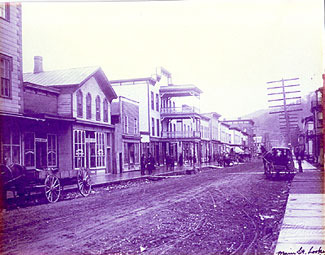
Colin
has had to answer many queries over the years regarding
this song so he decided to dedicate a spot on his
web site to the topic. Here then is the story behind
the town and the song "Tidioute, Pennsylvania-Re-visited.
Tidioute, Pennsylvania (pronounced: tiddy-oot) is a
little hamlet that sits on the banks of the Allegheny
river in the beautiful Allegheny forest in Northwestern
Pennsylvania. The borough of Tidioute is southeast
of Erie, Pennsylvania, North of Pittsburgh, Pennsylvania
and is roughly 158 miles east of Colin's hometown,
Cleveland, Ohio.
Tidioute
is an Iroquois (Seneca) Indian word that means "protrusion
of land". It was named this by the Indians because
of the sharp bend in the Allegheny river that occurs
at the site where Tidioute stands, thus creating a
peninsula.
After
the discovery of oil in the nearby town of Titusville
in 1859, Tidioute became the site of the worlds very
first flowing oil well. In addition to this world
changing event, Tidioute is also the birthplace of
the Standard Oil Company. As a result of the discovery
of oil in the region many people made unfathomable
fortunes from the black gold that sprung forth from
the land. Millionaires were created and enormous wealth
was made as the still standing Victorian homes and
mansions in the surrounding towns beautifully illustrate.
Today
Tidioute is a quiet river community that is a permanent
home to roughly 800 residents. During the summer months
and hunting and fishing season the population swells
to several thousand people.
That
is the abridged version of the history of Tidioute.
Here then is how Colin Dussault came to know, love
and write a song about this part of the world:
In
the late 1960's & early 1970's Colin's father, his
fathers' friends and fellow hippies and longhairs
began going to the mountains just 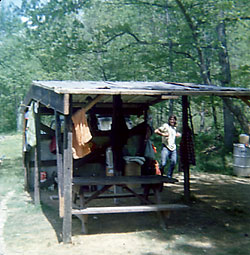 outside
of Tidioute to camp, relax and enjoy the natural beauty
and peaceful surroundings of the area. Colin's father
took his young family with him on these trips and
as a child Colin remembers looking out of the car
windows as his dad drove along the roads that wove
their way up and down the Allegheny forests dirt roads.
For several years Colin's Father Artie, his Mother
Laurel, his Uncle Brian Donahue, Sherry Donahue, Robbie
Toole and countless other friends and relatives would
traverse the mountain thoroughfares to a place where
they had set up a camp. They built a pavilion alongside
the creek and occasionally rented the little cottages
that sat nearby.
outside
of Tidioute to camp, relax and enjoy the natural beauty
and peaceful surroundings of the area. Colin's father
took his young family with him on these trips and
as a child Colin remembers looking out of the car
windows as his dad drove along the roads that wove
their way up and down the Allegheny forests dirt roads.
For several years Colin's Father Artie, his Mother
Laurel, his Uncle Brian Donahue, Sherry Donahue, Robbie
Toole and countless other friends and relatives would
traverse the mountain thoroughfares to a place where
they had set up a camp. They built a pavilion alongside
the creek and occasionally rented the little cottages
that sat nearby.
Colin,
his younger sister Jennifer and their friends, Sean
and Tracy Toole would explore the bear caves and climb
the large rocks that dotted the landscape of the woods.
They would swim, fish & play in the Allegheny river
and look under rocks for craw dads, frogs and minnows. They would pump water out of the well and play the
games that children play while running barefoot in
the grass. These children, and Colin in particular
grew up loving and respecting the land that their
parents had taken them to as youngsters.
They would pump water out of the well and play the
games that children play while running barefoot in
the grass. These children, and Colin in particular
grew up loving and respecting the land that their
parents had taken them to as youngsters.
Today
several of Colins' families' friends have permanent
homes and cottages in Tidioute. The area is still
a popular destination for holidays and weekends and
the same hippies and children of the sixties who went
to Tidioute on a regular basis 25 years ago continue
to return to the Tidioute to camp and enjoy the unspoiled
beauty and the majestic pines of "Allegheny Land".
Every
now and then these visitors to the mountains come
down from their 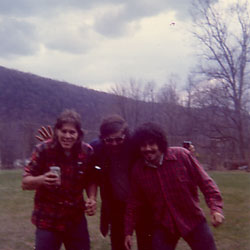 retreats
and head into town to hear music and enjoy some libations!
The place they head to and the bar that Colin pays
homage to in his song is the Hotel Tidioute located
on Main Street in dowtown Tidioute. The hotel was
built back in the late 1800's and has all the character
and charm of a bygone era. It was once a brothel,
a gambling den and a hotel. The old building boasts
an upstairs ballroom and comes complete with its'
own ghost! Today the hotel is a rooming house of sorts
for the local workers who man the timber mills, oil
wells and other labor intense means of making a living
that that the land offers.
retreats
and head into town to hear music and enjoy some libations!
The place they head to and the bar that Colin pays
homage to in his song is the Hotel Tidioute located
on Main Street in dowtown Tidioute. The hotel was
built back in the late 1800's and has all the character
and charm of a bygone era. It was once a brothel,
a gambling den and a hotel. The old building boasts
an upstairs ballroom and comes complete with its'
own ghost! Today the hotel is a rooming house of sorts
for the local workers who man the timber mills, oil
wells and other labor intense means of making a living
that that the land offers.
In
1994 Colin was driving home from Tidioute after spending
some time at the Sommerville's cotttage. He was there
clearing his mind and 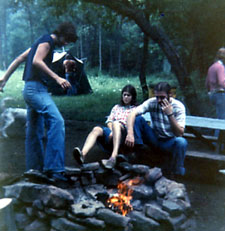 getting
his thoughts together. On the way home he began to
hear verses in his head that were the nucleus of the
song. He wrote the poem-like stanzas down on the back
of map books, napkins, scraps of paper and anything
else he could find while fighting to keep his Dodge
van on the dirt road that he was traversing. The song
that resulted was "Tidioute, Pennsylvania-Revisited".
getting
his thoughts together. On the way home he began to
hear verses in his head that were the nucleus of the
song. He wrote the poem-like stanzas down on the back
of map books, napkins, scraps of paper and anything
else he could find while fighting to keep his Dodge
van on the dirt road that he was traversing. The song
that resulted was "Tidioute, Pennsylvania-Revisited".
Colin
began performing the song at Around The Corner Saloon
on Sunday nights with guitarists Jim Tigue & Austin
"Walkin' Cane" Charnaghat and upright bassist Fred
Tobey. After that he and his band recorded the song
for inclusion on the "LIVE AT BROTHER'S LOUNGE" CD
in 1995.
From
there the song took on a life of its own. With each
new incarnation of the band the arrangement was shaped
and reshaped and the performances grew stronger resulting
in the version heard today. The new vereses at the
end, made up by Colin on stage one night and implemented
after the song was already recorded, describes as
Colin puts it "our incessant desire to destroy the
land." It comments on "societies never ending quest
to cut down all of our trees and forests and erect
malls and plazas in their wake." It chastises the
"builders and buyers of the hastily constructed two
hundred thousand dollar plus homes in developments
named after the very habitats they destroy to build
upon. These people rape the land and then ironically
give the cardboard neighborhoods names like "West
Winds", "Briar Lakes", "Waterside Crossings" "Deer
Run", "Laurel Woods", 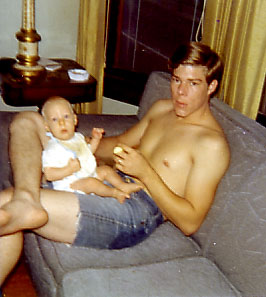 Highland
Park" and "Woodgate Farms". It is humorously macabre
in its stupidity and irony."
Highland
Park" and "Woodgate Farms". It is humorously macabre
in its stupidity and irony."
Colin
thinks that "the most incredible, beautiful, sad and
amusing sight is that of the old farm house, the falling
down barn, the discarded tractor from a place in history
that has all but vanished, still setting on a lot
of undeveloped land surrounded by million dollar,
poorly constructed, identically designed homes. These
unimaginative domiciles surround the old house and
inevitably they will overtake it but for now the original
homestead holds the encroachers at bay and stands
proudly, oblivious to how out of place it now looks
in this world of sameness.
Colin
says "I look at that scene and the most beautiful
home is the old farmhouse not the cardboard, cookie
cutter, press board boxes that are sprouting up like
weeds all around it. Those places all look the same.
They have no character whatsoever and they look and
feel so pretentious and overblown. They are built
so cheaply and quickly they can't possibly be built
with any pride or a concern for lasting quality. They
are simply thrown together and sold to meet the never
ending demand of the people who have a need for things
that are bigger, better and more expensive than the
things 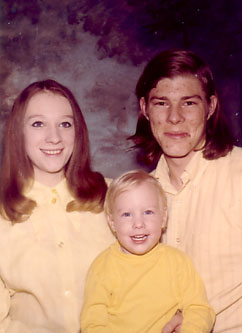 their
neighbors own. I think in keeping with the trend of
ironic names they should name their streets after
Thoreau! I read somewhere that today we have "smaller
families and bigger homes". This is no more evident
than when I drive by these developments. I think our
new national motto should simply be "pave the earth"."
their
neighbors own. I think in keeping with the trend of
ironic names they should name their streets after
Thoreau! I read somewhere that today we have "smaller
families and bigger homes". This is no more evident
than when I drive by these developments. I think our
new national motto should simply be "pave the earth"."
"In
stark contrast to these palatial edifices with rooms
too large and numerous to possibly enjoy is the little
farmhouse that was built 50 or 100 years ago. The
dwelling is still standing proudly and defiantly.
It is saying "go ahead with your destruction and veracious
appetite for consumption. I will sit here and I will
not go away." Of course inevitably that farm house
will disappear, despite its' stoic last stand, and
with it so will all of the character and charm of
our cities and towns. This is already evident and
each day it becomes more and more clear. There are
no more "ma and pa" corner stores or restaurants.
No more real "home cooking". It has all been taken
over by corporate entities who view people as consumers,
dollar signs, numbers and profit margins. " In reference
to this Colin wrote in his song, "I think that
every single corner, in every single city, all across
America today they all start to look the same, They've
got the same 12 corporate restaurant chains with the
same fucking buildings and names. I used to watch
the sun rise up from behind the barns in the mornings
on my way to school, Now a 12 acre mall has replaced
the farm and their is a Walmart instead of crops and
mules."
When
considering why "Tidioute" is such a popular song
Colin reasons " I think everybody has a special place
that they go to. A place where  they
grew up camping or spending time with their families.
It might be in Pennsylvania, It might in Colorado
or in Michigan. It may be on Kelly's Island, in the
Poconos or a little mobile home trailer sitting in
the middle of nowhere. It doesn't matter what you
call the place the places are all the same in the
sense that they are our own little escape hatches
from the crazy world that we live in. That is a common
thread that most of us have. We all have a respite
from the world where we seek refuge. I just happened
to write about mine".
they
grew up camping or spending time with their families.
It might be in Pennsylvania, It might in Colorado
or in Michigan. It may be on Kelly's Island, in the
Poconos or a little mobile home trailer sitting in
the middle of nowhere. It doesn't matter what you
call the place the places are all the same in the
sense that they are our own little escape hatches
from the crazy world that we live in. That is a common
thread that most of us have. We all have a respite
from the world where we seek refuge. I just happened
to write about mine".
John
Prine wrote eloquently about this same topic when
he composed the song "Paradise" back in the ealry
'70's. Jon Mitchell too-"They paved paradise and put
up a parking lot".
Take
some time off from your busy life. Load up the car,
van or SUV, climb aboard your Harley and drive on
up to Tidioute, maybe then you will "understand!"
Hurry though. It may not be here tomorrow, we need
more stores and malls and houses and...




